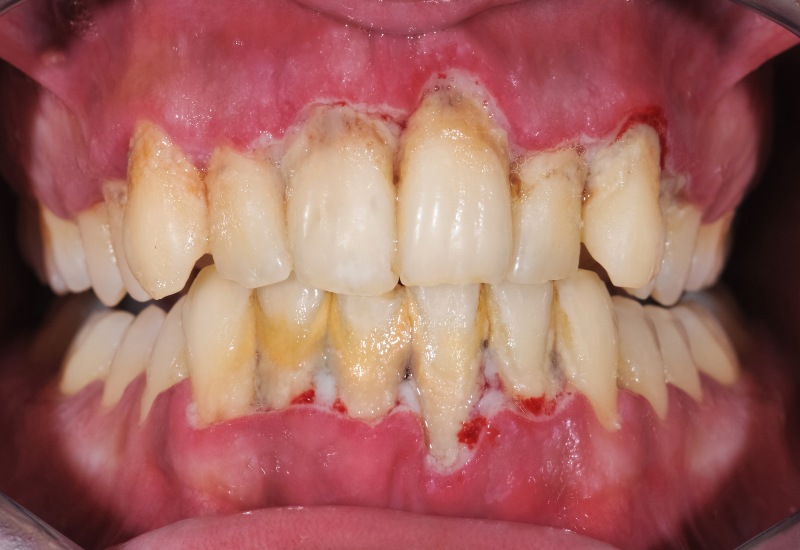What are Periodontal Diseases?

What are Periodontal Diseases?
The word periodontal refers to the tissue surrounding the teeth, otherwise known as the gums. Periodontal disease refers to an infection of the gums and surrounding tissues. Periodontal disease can be quite severe and can cause tooth decay and tooth loss. However, there are many treatments for periodontal diseases.
What Causes Periodontal Diseases?
You brush your teeth, so how could you develop periodontal disease? There are many causes of periodontal disease. The primary reason is the accumulation of plaque on the teeth and gums. Other factors can also contribute to the development of periodontal disease.
- Poor Oral Hygiene
Without adequate brushing and flossing, plaque can begin to form on the teeth and gums. - Tobacco Use
Tobacco use is terrible for gum health and can significantly contribute to poor gum health and periodontal disease. - Genetics
If your parents have periodontal disease, it is very likely that you will also have some form of periodontal disease. Some individuals are more prone to develop plaque, and some have sensitive gums that are easily inflamed. - Stress
A significant contributor to periodontitis, and one that is frequently overlooked, is stress. Many levels of stress can lead to poor immune health, which can lead to periodontitis. - Chronic Health Conditions
Certain health issues can create an environment that cultivates periodontitis. Individuals who are immunocompromised may have issues that cause tissues in the body to deteriorate, including gum tissue.

Symptoms of Periodontal Diseases
How do you know if you have one of the periodontal diseases? There are many signs and symptoms to be aware of.
- Puffy, swollen, red gums
- Chronic halitosis, or bad breath
- Loose teeth
- Bleeding while brushing or flossing
- Gum recession
- Change in bite alignment
- Pus between the teeth or pus on the gums
If you are experiencing any of these symptoms, you should consult with a physician as soon as possible.
Periodontal Disease Stages
- Gingivitis
During this preliminary stage of gum disease, you may notice bleeding when you brush or floss your teeth. You may also notice swelling of the gums. This is the perfect time to consult a dentist. This is the stage in which gum disease is completely reversible. - Advancing Periodontitis
If left untreated, gingivitis can rapidly progress and become advancing periodontitis. During this stage, it is probable that gum tissue will pull away from the teeth. This can be a problem, as the pulling away of the gums can cause pockets in which debris is collected, and infection can occur. At this stage, chronic bad breath (halitosis) can be a symptom. Other symptoms include loose teeth or gum recession. - Aggressive Periodontitis
Rapid progression of periodontal diseases can lead to severe symptoms, including significant gum recession, bone tissue destruction, and loose or lost teeth. - Chronic Periodontitis
Unfortunately, this is the most common form of periodontal disease, and it is not reversible at this stage. However, it is treatable. It is typically associated with poor oral hygiene habits and can include deep pockets between teeth and gum tissue, severely inflamed gums, and tooth loss. - Necrotizing Periodontal Diseases
At this stage, tissue necrosis occurs. It is usually experienced by those who suffer from other conditions. Those who are immunosuppressed due to medical issues are most susceptible to this stage of periodontal disease. Symptoms of this stage include excessive bleeding of the gums, extreme pain, and tooth loss.

Diagnosis for Periodontal Disease
A qualified dentist must diagnose periodontal disease. Your dentist will assess your symptoms and recommend treatment options. Once a dentist has diagnosed periodontal disease, they will likely refer you to a skilled specialist who tests and treats periodontal illnesses. This specialist is called a periodontist.
Periodontal Disease Treatment Options
A periodontist may recommend any of the following treatment options:
Nonsurgical Treatment Options
Patients with early stages of periodontal disease may be eligible for the following treatment options.
- Root Planning
Some periodontists practice root planning, which is the smoothing of the surface of the root. Creating a smooth surface makes it more difficult for bacteria and plaque to form on the root. - Scaling
Scaling is a deep cleaning under the gums that may include high-tech options such as lasers or sound waves. - Antibiotics
A periodontist may prescribe oral antibiotics for patients with infected gums. - Rinses or Gels
Antibiotics may also come in the form of a rinse or a gel.
Surgical Treatment Options
For patients with advanced periodontal disease, surgical options may be advised.
- Flap Surgery
This involves making a small incision in the gum to access the pocketed infection. The periodontist will then clean out the infection and stitch up the cut in the gum. - Bone Grafts
When bone damage occurs due to periodontitis, a doctor may recommend a procedure called bone grafting. This involves using a piece of bone—donated, taken from another part of the body, or artificial—to repair the damaged bone tissue. The graft is placed in the affected area to promote healing of the damaged bone. - Soft Tissue Grafts
A certified periodontist will use tissue from the side or roof of the mouth to replace the gum where the recession has occurred.
Periodontal Disease Prevention
Good oral hygiene is the most effective method of preventing periodontal disease. Continue brushing wisely (using a soft bristle and not too forcefully), flossing, and keeping up with regular checkups at the dentist. If you experience symptoms of periodontitis, see a dental professional as soon as possible.
Visit Dental Park for Periodontal Disease Treatment in McAllen, Texas
When you need help treating periodontal disease, turn to the experts at Dental Park. Located in McAllen, Texas, Dental Park is well-known for its compassionate commitment to patients and their care. For more information, visit our website or contact us today.
